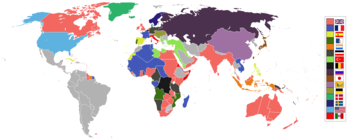
A colonial empire is a collective of territories (often called colonies), either contiguous with the imperial center or located overseas, settled by the population of a certain state and governed by that state.
Before the expansion of early modern European powers, other empires had conquered and colonized territories, such as the Roman Empire in Europe, North Africa and Western Asia. Modern colonial empires first emerged with a race of exploration between the then most advanced European maritime powers, Portugal and Spain, during the 15th century. The initial impulse behind these dispersed maritime empires and those that followed was trade, driven by the new ideas and the capitalism that grew out of the European Renaissance. Agreements were also made to divide the world up between them in 1479, 1493, and 1494. European imperialism was born out of competition between European Christians and Ottoman Muslims, the latter of which rose up quickly in the 14th century and forced the Spanish and Portuguese to seek new trade routes to India, and to a lesser extent, China.
Although colonies existed in classical antiquity, especially amongst the Phoenicians and the ancient Greeks who settled many islands and coasts of the Mediterranean Sea, these colonies were politically independent from the city-states they originated from, and thus did not constitute a colonial empire.[3] This paradigm shifted by the time of the Ptolemaic Empire, the Seleucid Empire, and the Roman Empire.
The European countries of the modern era that are most remembered as colonial empires are the United Kingdom, Spain, Portugal, Italy, Netherlands, France, Germany and Belgium..
History
European colonial empires
Portugal began establishing the first global trade network and one of the first colonial empires under the leadership of Henry the Navigator. The empire spread throughout a vast number of territories distributed across the globe (especially at one time in the 16th century) that are now parts of 60 different sovereign states. Portugal would eventually control Brazil, territories such as what is now Uruguay and some fishing ports in north, in the Americas; Angola, Mozambique, Portuguese Guinea, and São Tomé and Príncipe (among other territories and bases) in the North and the Subsaharan Africa; cities, forts or territories in all the Asian subcontinents, as Muscat, Ormus and Bahrain (amongst other bases) in the Persian Gulf; Goa, Bombay and Daman and Diu (amongst other coastal cities) in India; Portuguese Ceylon; Malacca, bases in Southeast Asia and Oceania, as Makassar, Solor, Banda, Ambon and others in the Moluccas, Portuguese Timor; and the granted entrepôt-base of Macau and the entrepôt-enclave of Dejima (Nagasaki) in East Asia, amongst other smaller or short-lived possessions.

During its Siglo de Oro, the Spanish Empire had possession of Mexico, South America, the Philippines, all of southern Italy, a stretch of territories from the Duchy of Milan to the Netherlands, Luxembourg, and Belgium, parts of Burgundy, and many colonial settlements in the Americas, Africa, and Asia. Possessions in Europe, Africa, the Atlantic Ocean, the Americas, the Pacific Ocean, and East Asia qualified the Spanish Empire as attaining a global presence. From 1580 to 1640 the Portuguese Empire and the Spanish Empire were conjoined in a personal union of its Habsburg monarchs during the period of the Iberian Union, but beneath the highest level of government, their separate administrations were maintained.
Subsequent colonial empires included the French, English, Dutch and Japanese empires. By the mid-17th century, the Tsardom of Russia, continued later as the Russian Empire, the Soviet Union, and modern Russia, became the largest contiguous state in the world and remains so to this day.
Throughout the 19th and early 20th century, by virtue of its technological and maritime supremacy, the British Empire steadily expanded to become by far the largest empire in history; at its height ruling over a quarter of the Earth's land area and 24% of the population. Britain's role as a global hegemon during this time ushered in a century of "British Peace", lasting from the end of the French Revolutionary and Napoleonic Wars to the start of World War I. During the New Imperialism, Italy and Germany also built their colonial empires in Africa.
